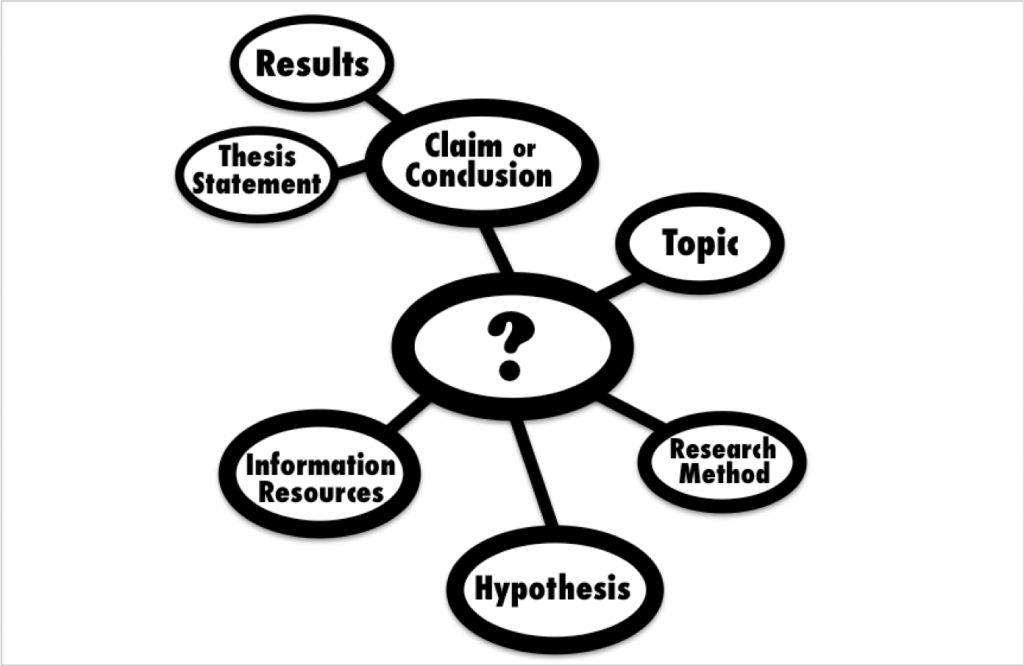Influence of a Research Question
Whether you’re developing research questions for your personal life, your work for an employer, or for academic purposes, the process always forces you to figure out exactly:
- What you’re interested in finding out.
- What is feasible for you to find out given your time, money, and access to information sources.
- How to find information, including what research methods will be necessary and what information sources will be relevant.
- What kind of claims you’ll be able to make or conclusions you’ll be able to draw about what you found out.
For academic purposes, you may have to develop research questions to carry out both small and large assignments. A smaller assignment may include doing research for a class discussion or to, say, write a blog post for a class; larger assignments may have you conduct research and critical assessment, then report it in a lab report, poster, term paper, or article. For large projects, the research question (or questions) you develop will define or at least heavily influence:
- Your topic, which is a part of your research question, effectively narrows the topic you’ve first chosen or been assigned by your instructor.
- What, if any, hypotheses you test.
- Which information sources are relevant to your project.
- Which research methods are appropriate.
- What claims you can make or conclusions you can come to as a result of your research, including what thesis statement you should write for a term paper or what you should write about in the results section based on the data you collected in your science or social science study.

Influence on Thesis
Within an essay, poster, or term paper, the thesis is the researcher’s answer to the research question(s). So as you develop research questions, you are effectively specifying what any thesis in your project will be about. While perhaps many research questions could have come from your original topic, your question states exactly which one(s) your thesis will be answering. For example, a topic that starts as “desert symbiosis” could eventually lead to a research question that is “how does the diversity of bacteria in the gut of the Sonoran Desert termite contribute to the termite’s survival?” In turn, the researcher’s thesis will answer that particular research question instead of the numerous other questions that could have come from the desert symbiosis topic.
Developing research questions is all part of a process that leads to the specificity of your project.
Tip: Don’t Make These Mistakes
Sometimes students inexperienced at working with research questions confuse them with the search statements they will type into the search box of a search engine or database when looking for sources for their project. Or, they confuse research questions with the thesis statement they will write when they report their research. The activity below will help you sort things out.
Influence on Hypothesis
If you’re doing a study that predicts how variables are related, you’ll have to write at least one hypothesis. The research questions you write will contain the variables that will later appear in your hypothesis(es).
Influence on Resources
You can’t tell whether an information source is relevant to your research until you know exactly what you’re trying to find out. Since it’s the research questions that define that, they divide all information sources into two groups: those that are relevant to your research and those that are not—all based on whether each source can help you find out what you want to find out and/or report the answer.
Influence on Research Methods
Your research question(s) will help you figure out what research methods you should use because the questions reflect what your research is intended to do. For instance, if your research question relates to describing a group, survey methods may work well. But they can’t answer cause-and-effect questions.
Influence on Claims or Conclusions
The research questions you write will reflect whether your research is intended to describe a group or situation, to explain or predict outcomes, or to demonstrate a cause-and-effect relationship(s) among variables. It’s those intentions and how well you carry out the study, including whether you used methods appropriate to the intentions, that will determine what claims or conclusions you can make as a result of your research.
Exercise: From Topic to Thesis Statement
